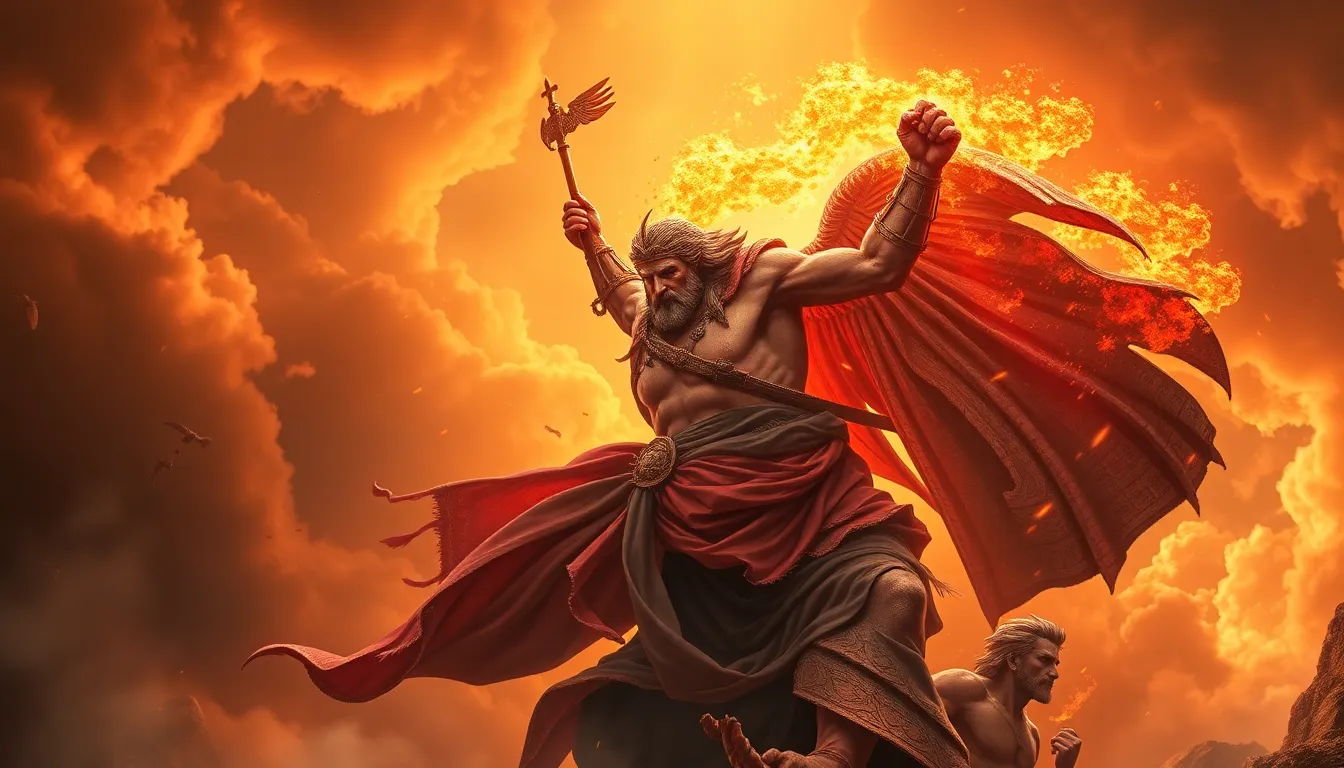The Myth of Prometheus: A Timeless Tale of Defiance
I. Introduction to Prometheus
Prometheus, a figure from Greek mythology, stands as a beacon of defiance and intellectual pursuit. His story has been told and retold through centuries, originating from ancient Greek tales that explore the complexities of creation, rebellion, and the human experience. As one of the Titans, Prometheus is often seen as a champion of humanity, embodying the struggle against divine authority.
His significance in Greek mythology cannot be overstated. Prometheus is not only a pivotal character in the ancient narratives but also serves as a symbol of enlightenment, reflecting humanity’s quest for knowledge and the consequences that often accompany such pursuits. This myth illustrates the duality of creation, where the act of giving life is paired with the burdens that come with it.
II. The Story of Prometheus
The tale of Prometheus is rich with themes of creation and rebellion. It begins with the creation of humanity, where Prometheus, having shaped mankind from clay, instilled them with life and intellect. Unlike other beings, humans were gifted with the ability to think, reason, and aspire for greatness.
However, it was the theft of fire from the gods that solidified Prometheus’s place in mythological history. Fire, a symbol of knowledge and civilization, was reserved for the divine. Defying Zeus, the king of the gods, Prometheus secretly delivered fire to humanity, igniting their potential for progress and innovation.
This act of defiance did not come without consequences. Zeus, infuriated by Prometheus’s actions, devised a severe punishment. He ordered Prometheus to be bound to a rock, where an eagle would feast on his liver daily, only for it to regenerate each night, ensuring his suffering was eternal. This punishment serves as a reminder of the price of rebellion against divine authority.
III. Themes of Defiance and Rebellion
Prometheus embodies the theme of rebellion against tyranny. His actions challenge the established order, and his defiance raises questions about authority, freedom, and the moral implications of such rebellion.
- Prometheus as a symbol of rebellion: His story reflects the struggle against oppressive forces, inspiring countless generations to challenge the status quo.
- Moral implications of defiance: The myth raises questions about the ethics of defiance, particularly when the result can lead to suffering, both for the defiant and those they seek to help.
- Creator and creation relationship: Prometheus’s relationship with humanity highlights the responsibilities of creators towards their creations, emphasizing the complexities involved in such dynamics.
IV. The Role of Suffering in the Myth
Suffering plays a pivotal role in the myth of Prometheus. His eternal punishment serves not only as a consequence for his actions but also as a profound commentary on the nature of suffering itself.
- Prometheus’s eternal punishment: Bound to a rock, his daily torment symbolizes the heavy toll that comes with the pursuit of knowledge and the desire to uplift others.
- Suffering as a path to enlightenment: The myth suggests that through suffering, one can gain deeper insights into existence, morality, and the human condition.
- Connection to human struggle: Prometheus’s plight resonates with the human experience of resilience in the face of adversity, reflecting our own struggles and triumphs.
V. Prometheus in Literature and Art
Prometheus has left an indelible mark on literature and art throughout history. His myth has inspired countless works, from classical tragedies to modern interpretations.
- Influence on classical literature: Aeschylus’s play “Prometheus Bound” is one of the most famous depictions of his story, exploring themes of justice and suffering.
- Representation in Renaissance art: Artists like Peter Paul Rubens have captured the dramatic essence of Prometheus’s punishment, immortalizing his defiance in visual art.
- Modern adaptations: The myth continues to inspire contemporary writers and filmmakers, with adaptations that explore the relevance of Prometheus’s story in today’s context.
VI. Prometheus as a Cultural Icon
Prometheus has evolved into a cultural icon, representing not only the quest for knowledge but also the spirit of rebellion against oppressive systems.
- Symbol of enlightenment: He embodies the ideals of intellectual freedom and the pursuit of knowledge, often seen as a precursor to Enlightenment thinkers.
- Connection to revolutionary movements: His story has inspired various revolutionary movements throughout history, symbolizing the fight against tyranny and oppression.
- Contemporary relevance: In discussions on ethics and technology, Prometheus serves as a cautionary figure, reminding us of the potential consequences of unchecked ambition and innovation.
VII. The Legacy of the Promethean Myth
The legacy of Prometheus endures in modern society, highlighting themes that remain relevant today.
- Enduring relevance: The myth of Prometheus continues to resonate, prompting reflections on the balance between knowledge, power, and responsibility.
- Prometheus in popular culture: His influence can be seen in films, music, and literature, where he serves as a metaphor for the human condition and the quest for enlightenment.
- Lessons learned: The Promethean myth teaches us about the responsibilities that come with knowledge and the importance of considering the ethical implications of our actions.
VIII. Conclusion
In conclusion, Prometheus holds a significant place in mythology as a figure of defiance and enlightenment. His story encourages us to reflect on the balance between the pursuit of knowledge and the responsibilities that accompany it. The timeless nature of Prometheus’s tale continues to inspire and provoke thought, urging us to consider the implications of our own defiance and the potential consequences it may bring.
Through the lens of Prometheus, we are reminded of the delicate dance between ambition and accountability, challenging us to navigate our own paths with wisdom and foresight.




